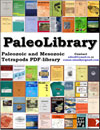
Complete Data Base of Paleozoic and Mesozoic Tetrapods.
Paleo-News and illustrations. Big electronic PDF-library.
| |
| PaleoNews |
| Classification |
| Books and Articles |
| Contact |
| Forum |
сайт о динозаврах
рейтинг сайтов
Free Counter
myspace hit counter
An Injured Psittacosaurus (Dinosauria: Ceratopsia) from the Yixian Formation (Liaoning, China): Implications for Psittacosaurus biology. |
June 15 , 2016 We describe a Psittacosaurus specimen from the Lujiatun beds of the Yixian Formation in Liaoning, China with an abnormality on its left fibula. Although a large number of Psittacosaurus specimens are known, only a single example of a pathologic Psittacosaurus has been previously noted. The specific pathology in the current specimen is believed to be a healed fibular fracture as assessed through a combination of gross morphology, microcomputed tomography (microCT), and histology data. The fracture can be identified using microCT, but the degree of remodeling and the stage of fracture repair are best determined histologically. The fracture callus is made up of radially-oriented spokes of woven bone in a cartilage matrix and the original cortical bone prior to the fracture has been largely eroded. A transverse histologic section taken at the level of the fracture shows the displacement of the proximal and distal parts of the fibula. The Psittacosaurus appears to have survived the break considering the deposition of circumferential non-pathologic bone at the periosteal surface outside of the callus. The combination of gross morphological description, microCT data, and histologic data allowed for a full diagnosis of the abnormality. While some previous authors have preferred gross morphological description above other methods for assessing paleopathologies, it is evident based on this specimen that an amalgam of techniques provides greater clarity to paleopathology diagnoses. Although this Psittacosaurus lived in an environment with many predators, it was able to survive with a fracture on its hindlimb, which undoubtedly would have impacted its locomotion. B. P. Hedrick, C. Gao, A. R. Tumarkin-Deratzian, C. Shen, J. L. Holloway, F. Zhang, K. D. Hankenson, S. Liu, J. Anné and P. Dodson (2016)
|
